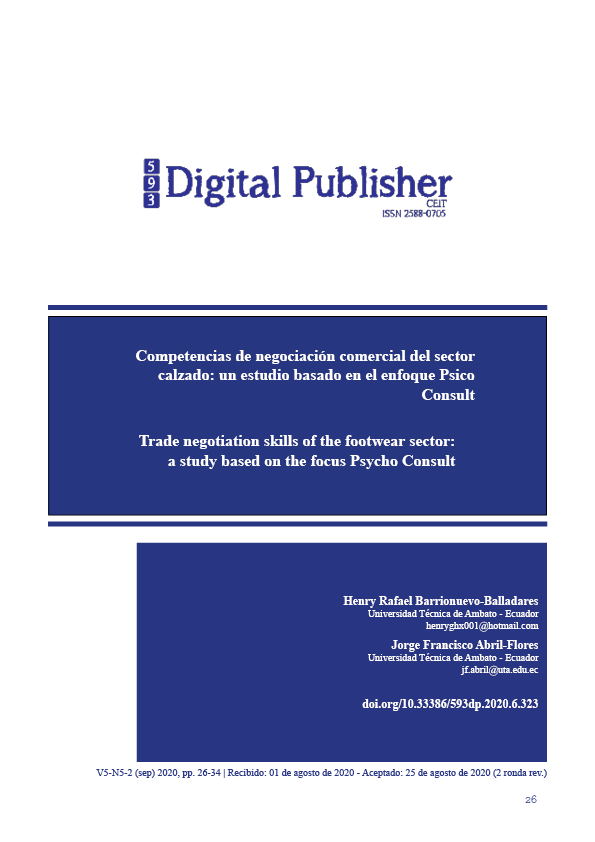Trade negotiation skills of the footwear sector: a study based on the focus Psycho Consult
Main Article Content
Abstract
The province of Tungurahua is the leading producer and marketer of national footwear, with 65.0% of the production of national footwear. The Psycho Consult Approach is an evaluation methodology for 4 negotiation skills, which are: 1) technical skills, 2) personality skills, 3) team skills, and 4) managerial and administrative skills. The study proposes an investigator the degree of mastery of the negotiation skills of the footwear sector of Tungurahua. The methodology approach addresses the following particularities; exploratory study, bibliographic methodology, qualitative approach and digital data analysis plan. The results indicate that there is a high mastery of personality competencies and notable deficiencies in administrative and managerial competences. It is concluded that negotiators have the necessary competencies to generate constant relationships and transactions with consumers.
Downloads
Article Details

This work is licensed under a Creative Commons Attribution-NonCommercial-ShareAlike 4.0 International License.
1. Derechos de autor
Las obras que se publican en 593 Digital Publisher CEIT están sujetas a los siguientes términos:
1.1. 593 Digital Publisher CEIT, conserva los derechos patrimoniales (copyright) de las obras publicadas, favorece y permite la reutilización de las mismas bajo la licencia Licencia Creative Commons 4.0 de Reconocimiento-NoComercial-CompartirIgual 4.0, por lo cual se pueden copiar, usar, difundir, transmitir y exponer públicamente, siempre que:
1.1.a. Se cite la autoría y fuente original de su publicación (revista, editorial, URL).
1.1.b. No se usen para fines comerciales u onerosos.
1.1.c. Se mencione la existencia y especificaciones de esta licencia de uso.
References
Arenal, C., & Ladrón, M. (2018). Gestión de la fuerza de ventas y equipos comerciales. San Millán: Editorial Tutor Información.
Báez, A., Bustamante, L., & Vital, E. (2019). Investigación bibliográfica sobre la relación sociedad medicina para el mejoramiento del desempeño docente. Panorama, Cuba y Salud, 14(1), 52-54.
Barreto, V. (2016). Tratados comerciales: un reto para el sindicalismo. Nueva Sociedad(264), 125-133.
Budjac, B. (2017). Técnicas de negociación y resolución de conflictos. México: Pearson Educación.
Chávez, E. (2020). Análisis comparativo de competencias emprendedoras entre estudiantes de la UABC. Revista Iberoamericana para Investigación y Desarrollo Educativo, 10(20), 1-24.
Cid, G., & Montiel, L. (2019). Negociaciones de máxima probabilidad para juegos cooperativos con fines comerciales. Revista Mexicana de Economía y Finanzas, 14(2), 245-259.
Elizondo, M., Montalvo, J., Pérez, J., Muñoz, J., & Muñoz, L. (2018). Model Design of Management Competences and Its Implementation Process for SMES: Diagnostic Evaluation of the Retail Sector. International Journal of Management and Marketing Research, 11(1), 73-97.
Fisher, R., Ury, W., & Patton, B. (1961). Obtenga el sí: el arte de negociar sin ceder. Bogotá: Norma.
Henao, C., Fierro, I., & Cardona, D. (2017). La negociación profesional, un acercamiento conceptual. Espacios, 38(32), 12-24.
Hernández, D., Armenteros, M., Villanueva, Y., Montalvo, J., & Río, B. (2016). Competencias directivas en el sector industrial: Medición del desempeño en empresas de Coahuila, Mexico. Revista Internacional Administración & Finanzas, 9(3), 1-28.
INEC. (2019). Boletín Técnico N° 02-2019-IPI-M. Quito: Instituto Nacional de Estadísticas y Censos.
Jara, M. (2016). Enfoque y prácticas en la evaluación de programas. Rev. Gerenc. Polit. Salud, 15(30), 251-252.
Karrass, C. (1970). The Negotiating Game. Miami: Business.
Maxwell, R., & Usher, W. (1991). Obtenga el sí: el arte de negociar sin ceder. Bogotá: Penguin Group.
Mejía, C., Herrera, J., Zambranio, S., & Medina, V. (2020). Competencias gerenciales en el clima organizacional de las empresas del sector de calzado. CIENCIAMATRIA, 6(10), 129-157.
Otero, M. (2019). Formación inicial del profesorado basada en competencias. Revista Estudios en Educación, 2(2), 123-141.
Paz, J. (2016). Negoiación: Competencia gerencial por antonomasia. Revista EIA, 1(1), 81-98.
Pazmay, S. (2019). Mejoramiento de comunicación interna en empresas de calzado en Tungurahua-Ecuador. PODIUM, 1(36), 23-34.
Psico Consult. (1996). Manual descriptivo y de aplicación de la prueba de estilo gerencial. Caracas: Psico Consult S.A.
Raiffa, H. (1996). El arte y la ciencia de la negociación. México: Fondo de Cultura Económica.
Saieh, C., Rodríguez, D., & Opazo, M. (2020). Negociación: ¿Cooperar o competir? Santiago: Ediciones Universidad Católica de Chile.
Sánchez, F. (2019). Fundamentos epistémicos de la investigación cualitativa y cuantitativa: Consensos y disensos. Revista Digital de Investigación en Docencia Universitaria, 13(1), 102-122.
Tapia, L., Lucero, Y., & Valenzuela, R. (2019). Pregunta, hipótesis y objetivos de una investigación clínica. Revista Médica Clínica Las Condes, 30(1), 29-35.
Ury, W. (2020). Obtenga el sí consigo mismo: Superar los obstáculos interiores para negociar con éxito. Barcelona: Gestión 2000.
Useche, M., Giler, M., & Guerrero, L. (2019). Competencias gerenciales en el ámbito empresarial zuliano. Revista de Ciencias Sociales, 25(1), 173-185.
Ventura, J. (2017). ¿Población o muestra?: Una diferencia necesaria. Revista Cubana de Salud Pública, 43(3), 648-649.



